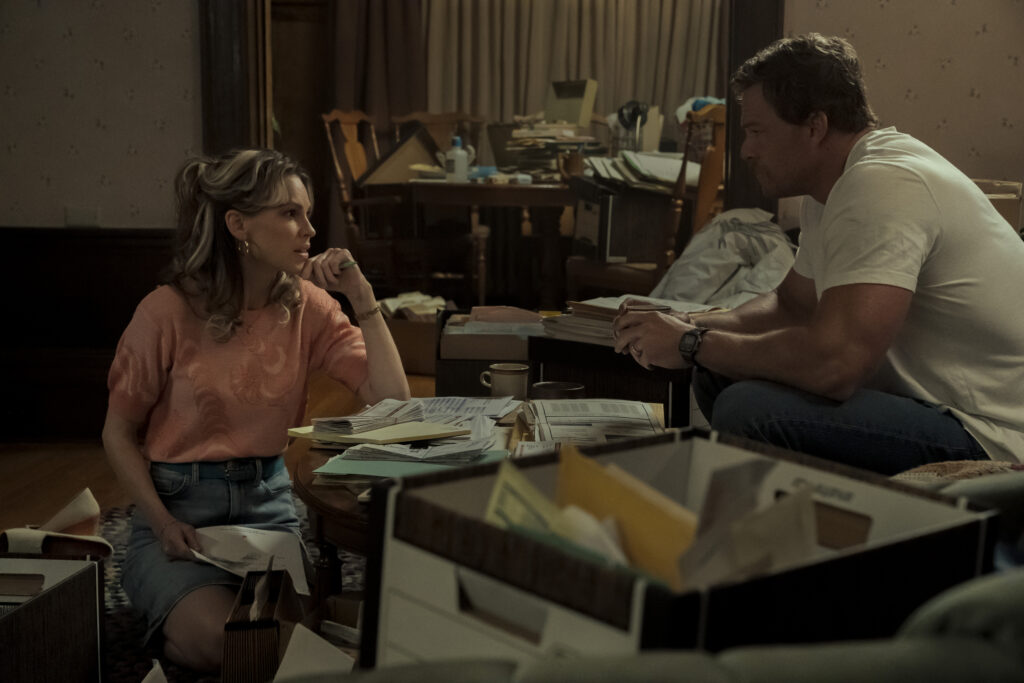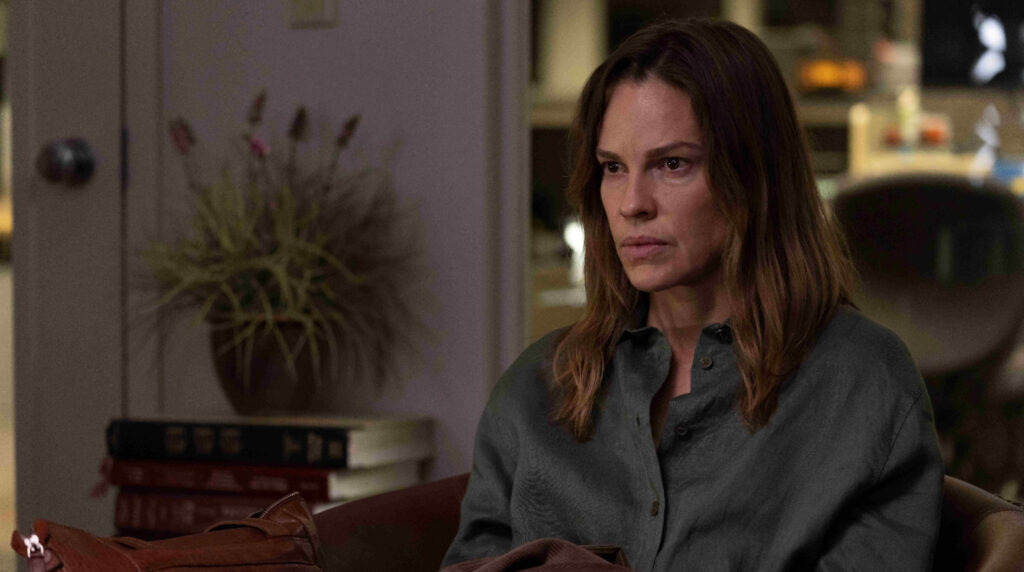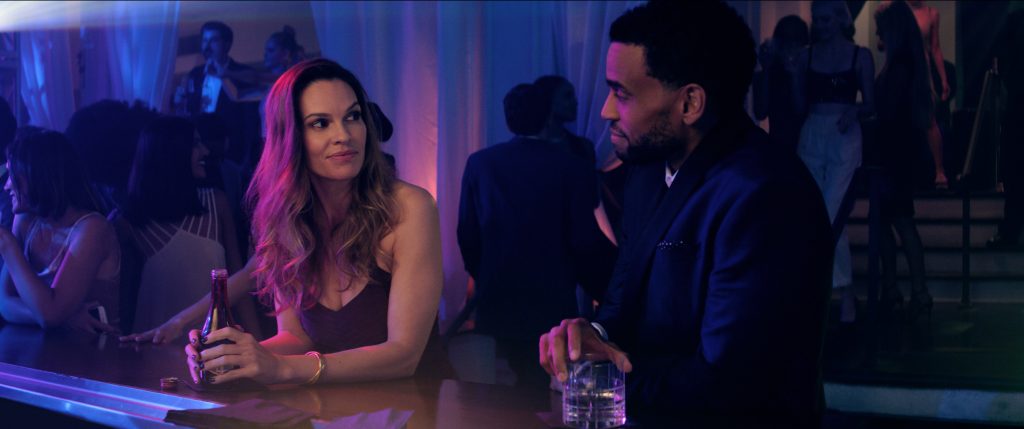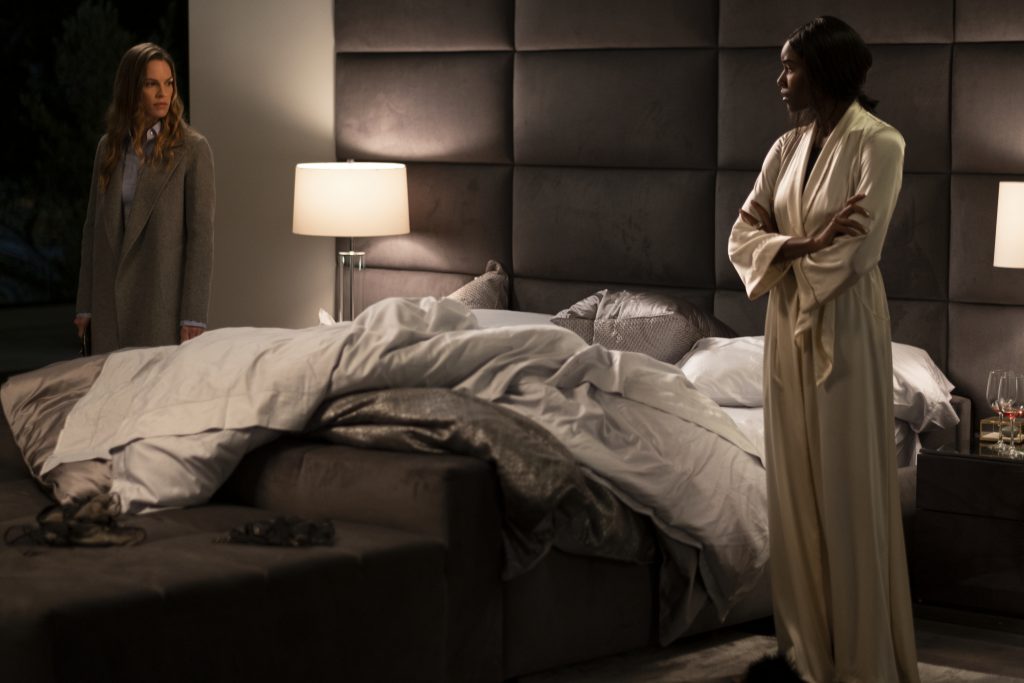February 20, 2024
by Carla Hay

Directed by Jon Gunn
Culture Representation: Taking place in Louisville, Kentucky, in 1993 and 1994, the dramatic film “Ordinary Angels (inspired by real events) features a predominantly white cast of characters (with some African Americans and one Asian) representing the working-class, middle-class and wealthy.
Culture Clash: An alcoholic hair stylist feels compelled to help a 5-year-old girl, who is dying from a liver disease and whose family can’t afford her medical expenses, which include a liver transplant that’s needed to save her life.
Culture Audience: “Ordinary Angels” will appeal primarily to fans of star Hilary Swank and faith-based movies that over-exaggerate true stories.

“Ordinary Angels” is supposed to be based on a true story, but it has plot holes and a fluffy fantasy that all you need to erase medical expenses is a woman who can make $435,000 in hospital bills disappear with sweet talking and blueberry muffins as gifts. There is literally a scene where the protagonist convinces a hospital to cancel this debt by asking a hospital administrator in a meeting how it would feel if the administrator had a sick daughter and couldn’t pay her medical bills. That’s just one of many eye-rolling “only in a movie” scenarios that “Ordinary Angels” tries to shove down viewers’ throats and expect people to swallow as the whole truth.
It’s condescending and gross pandering that will only work with people who want to ignore or forget that medical care in places without universal health insurance has disturbing inequalities for people who aren’t in certain demographics. The end of the movie also has a hokey “race against time” during a blizzard that looks like a real event was very exaggerated in the movie for dramatic purposes. And in other parts of the movie, the truth and reality are over-simplified in order to manipulate certain emotions out of viewers.
Directed by Jon Gunn, “Ordinary Angels” was written by Kelly Fremon Craig and Meg Tilly. The movie takes place in Lexington, Kentucky, in 1993 and 1994. (“Ordinary Angels” was actually filmed in Manitoba, Canada.) In other words, this story took place before the existence of the Internet and social media, which are now common ways for people to raise funds for medical expenses. And the story also takes place before the Affordable Care Act existed in the United States, because the family experiencing the child medical crisis in this story did not have health insurance at the time.
The protagonist of “Ordinary Angels” has the disease of alcoholism and is estranged from her young adult son (her only child) because of her alcoholism. However, she is presented in this unrealistic-looking movie as someone who is a crusading angel in all other aspects of her life, where everything conveniently falls into place because she’s able to talk her way into getting what she wants. On her road to redemption, she has chosen a dying girl to be her obsessive “pet project.”
“Ordinary Angels” begins in 1993, by showing a talkative divorcée named Sharon Stevens (played by Hilary Swank) at a bar, doing something that she’s done many times in her life: Get drunk and call attention to herself with her drunken antics. She wakes up with a hangover and finds out that her boss/close friend Rose (played by Tamala Jones) brought her home from the bar the night before, because Sharon was too drunk to get home on her own. Rose owns the hair salon Shear Elegance, where Sharon works as a hair stylist.
Rose sternly lectures Sharon about this drunken blackout that Sharon has had: “This can’t happen again. I’m officially worried.” Shortly after this incident, Rose persuades Sharon to go to an Alcoholics Anonymous meeting, where Sharon defiantly declares to everyone: “I’m not an alcoholic. I’m just a pissed-off hairdresser with a splitting headache and an annoying friend.”
Swank has done this type of “sassy with grit” character many times before (see most of the movies where she’s had a starring role), so there’s nothing new or surprising about her performance. Just like the other performances in “Ordinary Angels,” it’s serviceable and predictable. “Ordinary Angels” is a faith-based movie, so expect to see a lot of references to God and praying. That’s not what’s offensive about this movie. What’s offensive is how it relentlessly insults viewers’ intelligence about how medical crises can be solved in the real world.
After leaving the Alcoholics Anonymous meeting, Sharon sees a front-page newspaper story about a 35-year-old mother named Theresa Schmitt (played by Amy Acker, shown in flashbacks), who has died of Wegener’s disease and has a daughter who needs a liver transplant. (The real Theresa Schmitt actually died of the Wegener’s disease in 1992, at the age of 29.) Theresa’s surviving family members include her husband Ed Schmitt (played by Alan Ritchson) and their two daughters: 5-year-old Michelle Schmitt (played by Emily Mitchell) and Ashley Schmitt (played by Skywalker Hughes), who’s about 7 or 8 years old.
Both children are cute and adorable, but the movie unrealistically shows them as having no personality flaws. These two siblings also don’t get into any arguments and don’t show any rivalry with each other, which is another example of how phony this movie looks. “Ordinary Angels” completely ignores what can happen when a sick child in the family gets almost all the attention and any other children in the family might start to feel neglected or resentful. In real life, Michelle was 3 years old when she needed a transplant, but the movie made her 5 years old, because a 5-year-old is more capable than a 3-year-old of saying precocious lines of “cute kid” dialogue, as Michelle does in this movie.
Michelle has a rare liver disease called biliary atresia. Ed, who works as an independent-contractor roofer, is overwhelmed with debts of more than $435,000 in medical bills for Michelle and his late wife Theresa. He has these medical bills because he does not have health insurance for himself or his family. Ed also has the burden of other expenses for himself and his family. After the death of Theresa, Ed’s retired mother Barbara Schmitt (played by Nancy Travis) has moved into the home to help Ed with Michelle and Ashley.
Sharon sees the news story about ailing Michelle and immediately feels like she wants to do something to help the Schmitt family. Sharon starts by going to Theresa’s funeral. And when Ed asks her who she is, Sharon awkwardly explains that she’s a stranger who wants to give her condolences. Ed uncomfortably thanks her and thinks that will be the last he’ll see of Sharon. But there would be no “Ordinary Angels” movie if that was the last time Ed saw Sharon.
After the funeral, Sharon throws herself full-force into raising money for the Schmitt family. She has a fundraising event at the hair salon. She hands out flyers. She tells everyone she knows about the fundraiser. The fundraiser gets more than $3,250. She then goes over to the Schmitt home to deliver the money, which Ed reluctantly takes, because (as the movie repeats often, to irritating levels) Ed doesn’t feel right about taking charity from this lady whom he thinks is kind of a mess.
Barbara is more open to accepting this help. She’s the one who persuades Ed to invite Sharon into the house for dinner when Sharon delivers the fundraising money as a surprise. “Ordinary Angels” makes it clear that Sharon does not have the ulterior motive of trying to have a romantic relationship with physically attractive Ed, who is still deep in grief over the loss of Theresa. However, Sharon inserts herself into the Schmitt family’s life like a volunteer nanny/business manager/life coach, including helping take care of Michelle and Ashley; sorting out Ed’s bills and explaining his finances to him; and giving career tips and pep talks to Ed when he comes up with an idea of how he can make more money as a roofer.
Sharon even accompanies Ed to a sales pitch meeting with a potential employer, and she speaks for Ed like she’s a publicist. At one point in the story, Ed privately comes right out and tells overzealous Sharon that he resents all the help she’s giving because he thinks he should be the one to give the most help to his family. Sharon just smiles and says that Ed can just keep on resenting while she keeps on helping. It’s a very glib answer that glosses over the way that Sharon has fixated so fast on this family.
Yes, Sharon is a do-gooder, but the way she goes about it is kind of stalker-ish. There’s a scene where she calls the hospital where Ed owes money and pretends to be his accountant sister (who doesn’t really exist), just so she can find out how much money Ed owes for his medical bills. (It’s how she finds out he owes $435,000.) It’s a huge invasion of privacy on Sharon’s part, not to mention a HIPAA violation for the hospital to give out this information, but the person on the other line tells Sharon this information, because the movie wants people to believe that “ordinary angel” Sharon is who she is and can be dishonest and violate people’s privacy in order to get what she wants.
Sharon’s overly perky and ultra-helpful persona is a mask for some deep-seated issues in her own personal life. A scene in the movie shows Sharon going to a bar where her musician son Derek (played by Dempsey Bryk) is setting up some musical equipment before his band’s performance. Sharon seems to want to make amends for whatever she did to hurt him, but Derek’s hostile reaction makes it obvious he’s not interested in a reconciliation at that moment. It’s mentioned later in the movie that Sharon’s ex-husband (who is also a musician and not seen in the movie) abandoned Sharon and Derek when Derek was a child.
It’s unclear when Sharon became an alcoholic, but this alcoholism caused her to be a parent who did a lot of emotional damage to Derek. The movie hints at but never goes into details about this abuse, because those details would ruin the movie’s narrative that Sharon is an “ordinary angel” who wants to redeem herself. You don’t have to be a psychiatrist to know that one of the main reasons why Sharon is doing this charity work is out of guilt for her own failures as a parent.
One of the other reasons why Derek is estranged from Sharon is because she won’t admit that she’s an alcoholic and won’t get help for this disease. Derek knows that Sharon has been spending a lot of time helping the Schmitt family. He makes a cutting remark, which is one of the best lines in an otherwise corny movie. Derek says to Sharon about Sharon’s obsession with helping Michelle: “That girl, I feel sorry for her, not because she’s sick but because she’s counting on you for help.”
Sharon is able to overcome big obstacles with some very trite montages of her calling up people or by going to people’s offices, usually with blueberry muffins as gifts. At one point in the movie, viewers might ask themselves, “Does Sharon even work at her salon job anymore?” That question is answered in another part of the movie, when Rose gets upset with Sharon for not showing up to work for weeks, because Sharon wants to spend her time helping the Schmitts. Most people in the real world would get fired over this chronic absenteeism, but “ordinary angel” Sharon guilt-trips Rose into not firing her, because she lectures Rose by saying Rose should be more understanding of Sharon’s charity crusade.
Perhaps one of the worst things about “Ordinary Angels” is how it portrays Ed as a gruff and reluctantly grateful parent who bizarrely refuses to accept any more donations at a time when Michelle needed the money the most for a liver transplant. At this point in the movie, he comes across as a selfish parent who has put his own personal pride over his child’s health. It’s completely heinous, but the movie excuses Ed’s parental attitude problem. It just becomes another plot device for “ordinary angel” Sharon to show Ed that she’s more generous and more capable of solving his family’s problems than he is.
There’s also an unspoken narrative in the movie that the “Ordinary Angels” filmmakers don’t want you to think about: Cute kids with deadly diseases are more likely to get help and donations from strangers, compared to other people with deadly diseases who aren’t cute kids. Does that make the lives of those “other people” less of a priority for people like Sharon Stevens? According to the way Sharon acts in this movie, the answer is “yes.” The harsh reality is that this “ordinary angel” was very selective in whom she wanted to give all of this help to that went above and beyond what most people in her situation would do.
It’s obvious that the filmmakers and stars of the movie made “Ordinary Angels” as an inspirational film with the intention to win awards. (There’s nothing Oscar-worthy about this movie though.) “Ordinary Angels” does a disservice to people who are going through real-life medical crises by warping the truth and exaggerating real circumstances to make this story look like a fairy tale. The only award that “Ordinary Angels” deserves is Most Likely to Give False Hope.
Lionsgate will release “Ordinary Angels” in U.S. cinemas on February 23, 2024.






